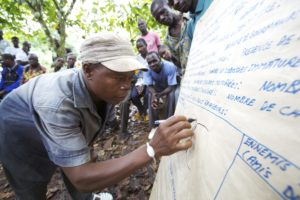Since its inception in 1977, the International Fund for Agricultural Development's (IFAD) work has centered on smallholder farmers and poor rural people. There are 500 million small farms around the world supporting about 2 billion people and providing food for many more. With the right support, small farmers can play a vital role in combatting poverty, hunger, and undernutrition. To help foster agricultural growth and rural development, the International Food Policy Research Institute (IFPRI) has contributed to IFAD’s work on strengthening the productivity of smallholders.
Farmer Field Schools (FFS) are local training centers that provide practical information and teach techniques tailored to local conditions. Since the first FFS was set up in Indonesia in 1989, these schools have gained popularity because of their hands-on approach to learning and emphasis on innovation. To date, there have been over 12 million graduates. Despite their success, only limited and often conflicting evidence was available on the effects of FFS on productivity and poverty.
In 2007, IFAD gave IFPRI a grant to evaluate FFS in Kenya, Tanzania, and Uganda. The resulting study, Impact of Farmer Field Schools on Agricultural Productivity and Poverty in East Africa, found that FFS were especially beneficial for women, people with low literacy levels, and farmers with medium-sized plots of land. Farmers who participated in these schools experienced increases of up to 80 percent in crop yields in Kenya and a rise of more than 100 percent in agriculture-related incomes in Tanzania, showing that FFS are effective in significantly increasing farmers’ productivity and improving their welfare. In 2013, the UK Department for International Development used this study to rationalize the inclusion of FFS in a £43 million project in Uganda.
For more information on IFPRI's work in partnership with IFAD, please go to this brochure.



